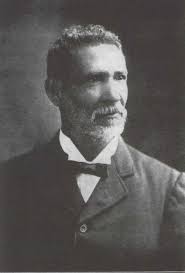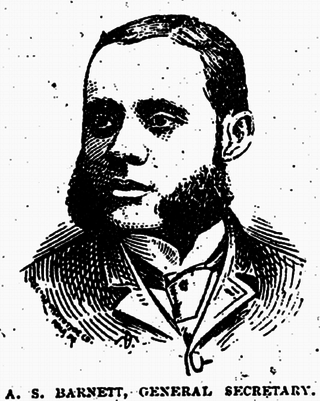Millard Filmore Singleton was an African-American political leader and civil servant in Omaha Nebraska. He was an officer in the Omaha Colored Republican Club and the Omaha branch of the National Afro-American League. He held posts as Justice of the Peace, storekeeper in the United States Internal Revenue Service, recorder of deeds for the city, and as bailiff of the municipal court.
John Albert Williams was a minister, journalist, and political activist in Omaha, Nebraska. He was born to an escaped slave and spoke from the pulpit and the newspapers on issues of civil rights, equality, and racial harmony. He was a highly respected minister, journalist, and civic leader. He served on many committees and boards among Omaha's black community and in the Omaha and Nebraska Episcopal Church.

Rodolphe Lucien Desdunes was a Louisiana Creole civil rights activist, poet, historian, journalist, and customs officer primarily active in New Orleans, Louisiana.

Daniel F. Desdunes was a civil rights activist and musician in New Orleans and Omaha, Nebraska.
Thomas P. Mahammitt was a journalist, caterer, civil rights activist, and civic leader from Omaha Nebraska. He was owner and editor for the black weekly, The Enterprise, Omaha's leading black paper at the turn of the 20th century. He was also an active leader in the Masons and the Boy Scouts and was named "Omaha's most distinguished Negro citizen" in 1934.

Ella Lillian Davis Browne Mahammitt was an American journalist, civil rights activist, and women's rights activist from Omaha, Nebraska. She was editor of the black weekly newspaper The Enterprise, president of Omaha's Colored Women's Club, and an officer of local branches of the Afro-American League. In 1895, she was vice-president of the National Federation of Afro-American Women, headed by Margaret James Murray, and in 1896 was a committee member of the successor organization, the National Association of Colored Women, under president Mary Church Terrell.

Edwin R. Overall aka Edwin R. Williams was an abolitionist, civil rights activist, civil servant, and politician in Chicago and Omaha. In the 1850s and 1860s, he was involved in abolition and underground railroad activities headed at Chicago's Quinn Chapel AME Church. During the U. S. Civil War, he recruited blacks in Chicago to join the Union Army. After the war, he moved to Omaha, where he was involved in the founding of the National Afro-American League and a local branch of the same. He was the first black in Nebraska to be nominated to the state legislature in 1890. He lost the election, but in 1892, his friend Matthew O. Ricketts became the first African-American elected to the Nebraska legislature. He was also a leader in Omaha organized labor.
Cyrus Dicks Bell was a journalist, civil rights activist, and civic leader in Omaha, Nebraska. He owned and edited the black newspaper Afro-American Sentinel during the 1890s. He was an outspoken political independent and later in his life became a strong supporter of Democrats. He was a founding member of the state Afro-American League and frequently spoke out against lynchings and about other issues of civil rights.
Ferdinand Lee Barnett was a journalist, civil rights activist, politician, and civil servant from Omaha, Nebraska. He was founder and editor of the newspaper The Progressive, which ran from 1889 to 1906 and served for a time as deputy clerk in the county court. He was elected to the Nebraska State House of Representatives in 1926.

Alfred S. Barnett was an American journalist and civil rights activist in Omaha, Nebraska, Des Moines, Iowa, and Chicago, Illinois. In Des Moines, Barnett created and ran the newspaper, The Weekly Avalanche from 1891 to 1894. Before moving to Des Moines, he contributed to his brother, Ferdinand L. Barnett's Omaha paper, The Progress. He worked for civil rights also a member and an officer of numerous civil rights organizations, including the Nebraska branch of the National Afro-American League and the Afro-American Protective Association of Iowa. Barnett was described as a "pleasing speaker".
George F. Franklin was a journalist and civic leader in Omaha, Nebraska, and Denver, Colorado. He owned and published two African-American newspapers, The Enterprise in Omaha, and The Denver Star in Denver. He was active in civil rights and was a member of the Nebraska branch of the National Afro-American League.

The history of African-Americans in Omaha in the 19th Century begins with "York", a slave belonging to William Clark of the Lewis and Clark Expedition who came through the area in 1804, before the city existed. African-Americans have lived in the Omaha area since at least 1819, when fur traders lived in the area.

Alphonso Wilson was an African-American activist in Omaha, Nebraska at the turn of the 20th century. Wilson was born in Bedford, Missouri in 1860. In 1880 he moved to Chicago and in 1886 he moved to Omaha. In Omaha he was a partner of the real estate firm Wilson & Bryant with James Bryant. In 1890 he was elected the Chairman of the Bureau of Immigration of the Nebraska branch of the National Afro-American League under president Matthew Ricketts. He also served as treasurer and a founding member of the Omaha Union League club, a social club and lyceum formed in 1895. In 1890, he was a member of a national building, loan, and protective union organized to assist Omaha blacks to buy or build a home. The local board of the group consisted of president George F. Franklin, vice president William Marshall, Secretary and Treasurer Alfred S. Barnett and Attorney James S. Bryant. The Board of Appraisers was Millard F. Singleton, Alphonso Wilson, and Harrison Buckner.
John Lewis was a hotel keeper, musician, and civil rights activist in Omaha, Nebraska. He was proprietor of the Lewis House in the early days of Omaha. In 1879, he organized a brass band which was a fixture in African-American events in Omaha in the 1880s. He was active in the Nebraska State Convention of Colored Americans, a part of the Colored Conventions Movement and involved in Republican politics in Omaha.
W. H. C. Stephenson was a doctor, preacher, and civil rights activist in Virginia City, Nevada, and Omaha, Nebraska. He was probably the first black doctor in Nevada and worked for the rights of blacks in that city. He was noted for his efforts in support of black suffrage in Nevada at the passing of the Fifteenth Amendment in 1870. He helped found the first Baptist church in Virginia City. He moved to Omaha in the late 1870s and continued his medical, religious, and civil rights work. He founded another Baptist church in Omaha, and was a prominent Republican and activist in the city.
James S. Bryant was a journalist and civil rights activist in Omaha, Nebraska. He worked with Ferdinand L. Barnett on his paper, The Progress in the 1890s.
Victor B. Walker was an American soldier, political activist, lawyer, civil rights activist, police officer, saloon owner, journalist, and gangster in the Old West, particularly in Omaha, Nebraska, and in Denver, Colorado, at the end of the 19th and beginning of the 20th century. Before coming to Omaha, he was a Buffalo soldier on the frontier, and when he first arrived in the city, he worked as a police officer. For a short time, he owned the Omaha saloon, The Midway, a center of gambling and criminal activity in the city. As well as a working as defense lawyer, he worked for civil rights and was a member of the Omaha Afro-American League, a civil rights organization in the city.

Ophelia Clenlans was a civil rights activist and journalist from Omaha, Nebraska.
William R. Gamble was a civil rights activist and barber in Lincoln, Nebraska and Omaha, Nebraska. Gamble was born a slave in Mobile, Alabama in about 1850. His wife, Eveline, had French-Canadian and Native American ancestry. They were married in Lincoln, Nebraska in 1873 and moved to Omaha, Nebraska around 1880. They had eight children. Gamble's oldest daughter Lucinda became Omaha's first black school teacher and eventually married Father John Albert Williams, serving as an active community leader in North Omaha throughout her life. His other children were William, Richard Joseph, Edward, Leonard, Fred, Mary, and George. Gamble died on April 16, 1910.
African Americans in Nebraska or Black Nebraskans are residents of the state of Nebraska who are of African American ancestry. With history in Nebraska from the Lewis and Clark Expedition through the Civil War, emancipation, the Reconstruction era, resurgence of white supremacy with the Ku Klux Klan and Jim Crow Laws, the Civil Right movement, into current times, African Americans have contributed vastly to the economics, culture, and substance of the state.







